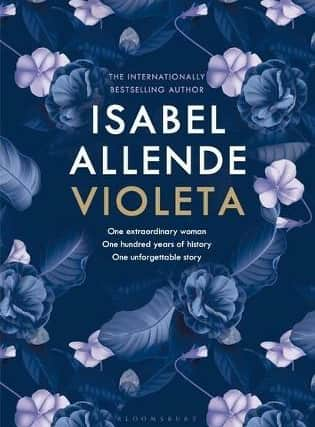Book review: Violeta, by Isabel Allende


Isabel Allende is a very fluent novelist. Her books rattle along, and make for easy and enjoyable reading. Like any good novelist she demands and deserves a certain suspension of disbelief on the part of her readers. Novelists, as Muriel Spark used to say, are liars, pretending that what they imagine really happened. Allende is mostly, though not always, a pretty convincing liar. Violeta is not a very long novel, but it covers a long period of time: a hundred years indeed. It is written in the first person and is, ostensibly, a letter from the hundred year-old narrator to her grandson. It begins in 1920 with the Spanish flu pandemic and ends in 2020 with our present Covid one and Violeta on the point of death. In between we have a family saga which also, like some of Allende’s previous novels, offers a potted history of Chile in her lifetime and even before it. This is quite acceptable if it is done well, and on the whole it is.
Violeta is born to a rich family, members of Chile’s governing class. However, its security is destroyed by the Wall Street crash of 1929 and the Depression that follows. After her father’s death, her only reliable brother Jose Antonio removes her, with her mother and Irish governess Miss Taylor, to the remote and backward south of the country where she grows up in a self-contained colony and assists the family’s benefactors, a married couple who work as itinerant teachers of the poor indigenous peasantry. Her marriage to a well-meaning German agronomist fails because he is impotent and bores her. She leaves him for a dashing and impressive pilot, Julian, who proves a scoundrel. Her husband refuses an annulment – divorce being then illegal in Chile – so she is spared marriage with Julian, but can never leave him despite his brutality and criminality. They have two children, whose story is an integral part of the novel.
Advertisement
Hide AdIts heart is predictably the 1973 coup, part organized by the CIA, which destroyed the leftist Government of Salvatore Allende (the novelist’s uncle) and resulted in the brutal dictatorship of General Pinochet. Allende has written about this before – no novel set in Chile in in these years can avoid it – but from a different angle or in a different voice. She catches very well the confusion, fear, horror and double standards of the time. Predictably the appalling Julian, who prides himself on being a realist, is involved. He is a monster, but Allende is not blind to his charisma, and the relationship between him and Violeta will take a very long time to be broken. The narrative is full of incident, variety and life, not always convincing.


As I say, Violeta is full of life, a great sweeping story like a river in spate. It makes for enjoyable and undemanding reading. This is its strength. I can’t imagine readers turning it aside because they are bored. For English-language readers it is agreeably exotic. There is a prosaic realism in the chronicle, happily without any tiresome Latin American “magic”.
Yet its weakness as a novel is equally evident. I use the word “chronicle” advisedly. This is what we are offered, one damn thing after another. What is missing is the dramatic. Everything is told in retrospect. Even the most important scenes are related from memory, often distant memory, with little if any sense of the immediate. It also seems that, in order to travel from one pandemic to another, over a span of a hundred years, credibility is sacrificed. On can’t quite believe in a narrator a hundred years old. What one misses is the immediate and dramatic big scene. The common command of creative writing schools – “show, don’t tell” – is often tiresome, the word “narrative” having its root in telling. Even so, we could do with more showing, less telling here. Perhaps this is why Violeta herself is never quite a convincing or indeed interesting character, her relationship with Julian, especially, is never brought convincingly to life.
Violeta, by Isabel Allende, Bloomsbury, 317pp, £16.99
A message from the Editor:
Thank you for reading this article. We're more reliant on your support than ever as the shift in consumer habits brought about by coronavirus impacts our advertisers.
If you haven't already, please consider supporting our trusted, fact-checked journalism by taking out a digital subscription at https://www.scotsman.com/subscriptions